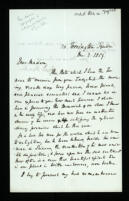30 Torrington Square - JH encloses a copy of a genealogical and biographical treatise of his family: 'It contains all that I have been able to discover respecting him [Field - presumably John Field the early English Astronomer], and I can not without hope that you may think he was an Englishman whose name ought not to be wholly passed over on speaking of men who have done something for the advancement of Science'. Field's tracts are very rare. JH is sorry he could not be of more help concerning Bacon but has become accustomed to think that almost everything concerning him has already been written by his numerous biographers. Nevertheless he supplies several references. JH provides information concerning several other people.
30 Torrington Square. - Believes Milnes' Shaw manuscript to be autograph; would like to understand more about the Earl of Strafford's marriage. Asks the provenance of Milnes' collection; some letters were once in the Museum of Thoresby of Leeds and have been published in the Biographica Britannica; gives further biographical details of the Countess; autograph buyers should beware counterfeits; his 'enlarged account of Scrooby' [Collections Concerning the Church or Congregation of Protestant Separatists formed at Scrooby, the Founders of New Plymouth...] now ready for printing.
30 Torrington Square. - Sends notes on the Will of Lady Margaret Wentworth of Hooton Roberts, Yorkshire, daughter of the Earl of Strafford and his third wife Elizabeth, née Rodes.
The Limes, Nelson Street, Manchester. - Was mistaken in citing Hunter's life of Oliver Heywood as authority for proclamation of Queen Elizabeth as Empress; the correct source is an anonymous history of the Church of England in the reign of the Tudors, published in 1851; quotes extract from Harleian MSS given in the book; if verified it would be more appropriate than Disraeli's references to Raleigh and Spenser.
